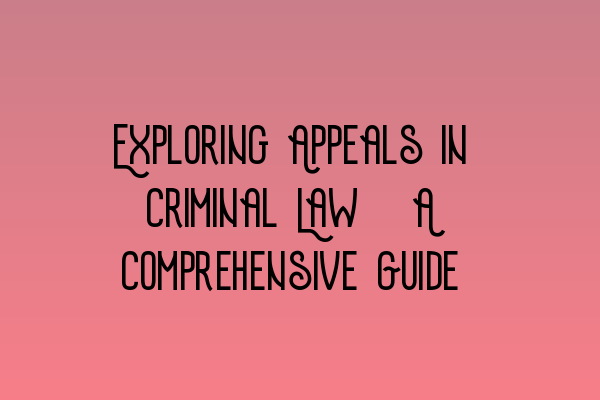Exploring Appeals in Criminal Law: A Comprehensive Guide
At SQE Criminal Law & Practice Law UK, we understand the complexities and challenges that accompany criminal law appeals. Whether you are a solicitor, a law student preparing for the SQE exams, or simply interested in criminal law, this comprehensive guide will provide you with valuable insights into the appeals process.
Understanding the Appeals Process
In criminal law, an appeal is a legal process through which a convicted individual seeks a review of their case by a higher court. The primary objective of an appeal is to challenge the decision made by a lower court and potentially have it overturned.
Before diving into the intricacies of the appeals process, it’s crucial to have a solid understanding of the different grounds on which an appeal can be filed. These grounds include errors of law, errors of fact, improper conduct, and new evidence.
When preparing for an appeal, it is essential to thoroughly analyze the original trial record, identify any deficiencies in the lower court’s decision, and construct a convincing argument to present to the higher court. This process requires a keen eye for detail and extensive knowledge of criminal law.
The Role of the Solicitor in Appeals
As a solicitor handling criminal law appeals, your expertise and knowledge play a pivotal role in achieving a successful outcome for your clients. From conducting a thorough assessment of the trial record to drafting persuasive written submissions and presenting oral arguments, your contribution is crucial at every stage of the appeals process.
By employing effective legal research techniques, you can discover precedents and legal principles that support your client’s case. These precedents can significantly strengthen your argument and increase the chances of a favorable outcome.
Furthermore, advanced advocacy skills are vital when presenting your client’s case in the higher court. Your ability to eloquently articulate complex legal arguments and effectively respond to the opposing counsel’s challenges will greatly influence the court’s decision.
Preparing for Success: SQE Criminal Law Courses and Exam Dates
At SQE Criminal Law & Practice Law UK, we offer comprehensive SQE 1 and SQE 2 preparation courses to help aspiring solicitors develop the necessary skills and knowledge to excel in their legal careers. Our courses cover a wide range of topics, including criminal law, appeals, and legal research techniques, equipping you with the tools needed for success.
For those preparing for the SQE exams, we also provide practice exam questions and mocks to simulate real exam scenarios. These resources allow you to assess your knowledge and progress, identify areas for improvement, and refine your exam technique. It’s a great way to build confidence and increase your chances of passing the exams with flying colors.
If you’re interested in exploring our SQE preparation courses or learning more about the SQE exam dates, please visit the following links:
- SQE 1 Practice Exam Questions
- SQE 1 Practice Mocks FLK1 FLK2
- SQE 2 Preparation Courses
- SQE 1 Preparation Courses
- SRA SQE Exam Dates
By enrolling in our courses and utilizing our exam resources, you’ll be taking a significant step towards achieving success in your legal career. The SQE exams are a rigorous test of your competence, but with the right preparation, you can overcome any challenge that comes your way.
Conclusion
The appeals process in criminal law presents a unique set of challenges that demand meticulous attention to detail, a deep understanding of legal principles, and advanced advocacy skills. As a solicitor, your role in the appeals process is integral to protecting your clients’ rights and ensuring justice is served.
At SQE Criminal Law & Practice Law UK, we are committed to providing comprehensive SQE preparation courses and resources to help you succeed in your legal career. With our expert guidance and your dedication, the appeals process can become a pathway to justice for those who need it most.
